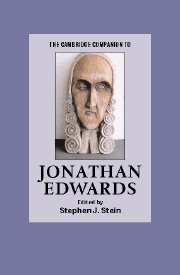Book contents
- Frontmatter
- Introduction
- Part I Edwards’s life and context
- Part II Edwards’s roles and achievements
- 5 Edwards as preacher
- 6 Edwards as revivalist
- 7 Edwards as theologian
- 8 Edwards as philosopher
- 9 Edwards as biblical exegete
- 10 Edwards as missionary
- Part III Edwards’s legacy and reputation
- The Works of Jonathan Edwards
- Further Readings
- Index
- Series List
8 - Edwards as philosopher
from Part II - Edwards’s roles and achievements
Published online by Cambridge University Press: 28 November 2007
- Frontmatter
- Introduction
- Part I Edwards’s life and context
- Part II Edwards’s roles and achievements
- 5 Edwards as preacher
- 6 Edwards as revivalist
- 7 Edwards as theologian
- 8 Edwards as philosopher
- 9 Edwards as biblical exegete
- 10 Edwards as missionary
- Part III Edwards’s legacy and reputation
- The Works of Jonathan Edwards
- Further Readings
- Index
- Series List
Summary
Rarely do accounts of early modern European philosophy mention Jonathan Edwards. His philosophical reflections are typically dismissed as inconsequential because, in the view of many historians of seventeenth- and eighteenth-century philosophy, he does not play a significant role in the discussion of issues raised by his contemporaries. His arguments seem to be so dominated by concerns with Calvinist doctrinal disputes that he is usually understood as an outsider commenting on discussions thematized by Descartes, Locke, and others. Even when he is juxtaposed with thinkers such as Samuel Clarke, Anthony Ashley Cooper (third earl of Shaftesbury), or Francis Hutcheson, he is portrayed as espousing views that are hopelessly immersed in Puritan theology.
Such a marginalizing treatment of Edwards is unfortunate, especially considering how he develops an alternative approach to the way that much of modern philosophy is practiced. He is not alone in pursuing that alternative, for he shares with the Cambridge Platonist Henry More, Nicolas Malebranche, G. W. Leibniz, George Berkeley, and other “theocentric metaphysicians ” the view that questions about existence, knowledge, moral judgments, and beauty can be resolved only by understanding things in terms of their place in the universe and their relation to God. For such thinkers, Cartesian minds and simple natures, Hobbesian bodies, and Lockean simple ideas simply cannot be the starting points for a legitimate philosophy, because such insular entities are unintelligible apart from the network of relations that identifies them in the first place.
- Type
- Chapter
- Information
- The Cambridge Companion to Jonathan Edwards , pp. 162 - 180Publisher: Cambridge University PressPrint publication year: 2006

